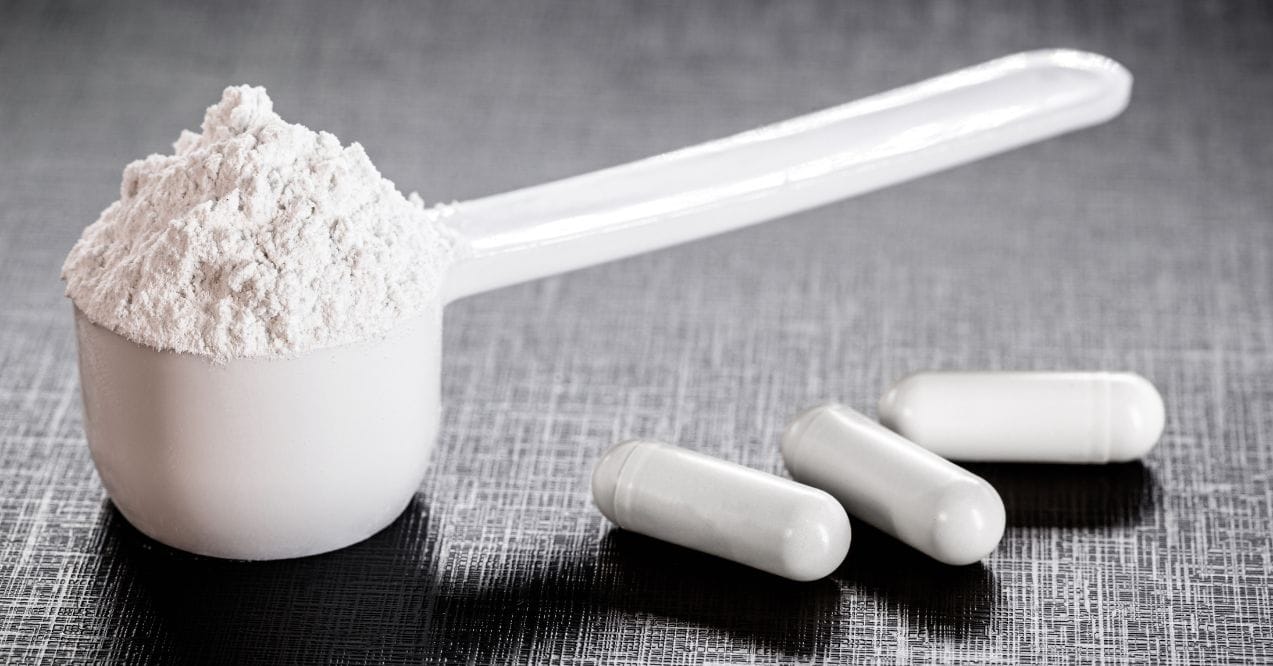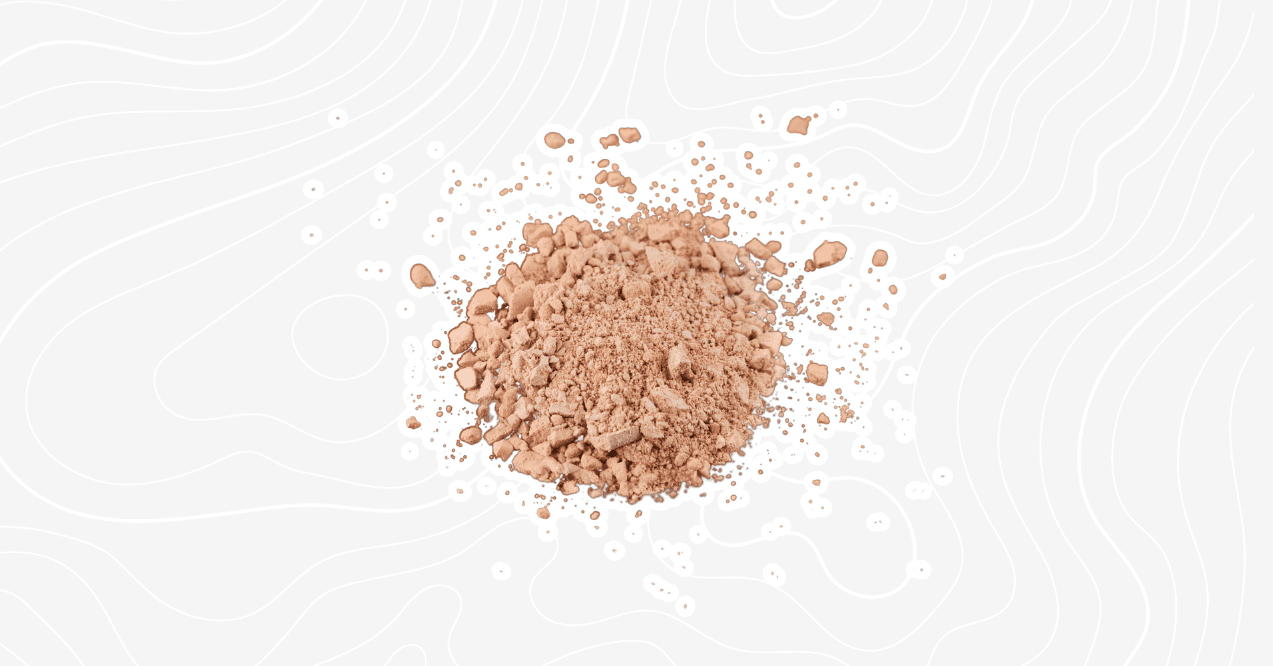6 Best Vitamins for Gut Health
The gut is a vital part of the body and digestive system, making it necessary to prioritize its health through proper diet and consuming the best vitamins for gut health. Besides digestion, it’s crucial for your overall well-being, including controlling the immune system for protection against diseases and infections and preventing the transfer of harmful bacteria to the bloodstream. Therefore, an unhealthy gut is detrimental.
However, you may find maintaining a healthy gut complicated without guidance. That explains the prevalence of digestive diseases affecting approximately 70 million people in the US. For instance, gastroesophageal reflux disease (GERD) has a whopping hold of about 7% of the population, while gallstones affect around 800,000 people.
But don’t let the numbers scare you; we’re here to tell you can protect your well-being.. How? By steering clear of disease-causing elements and improving your gut health using certain vitamins, foods, and lifestyle changes. Supplements also promote a healthy gut, which is why more health enthusiasts opt for superfood powders as an effective and easy complement to healthy diets. If you’re wondering how to get it right on what nutrients you need, we’ve got you covered in this article with all the secrets of gut health. Let’s dive in!
Key Article Findings:
Understanding Gut Health
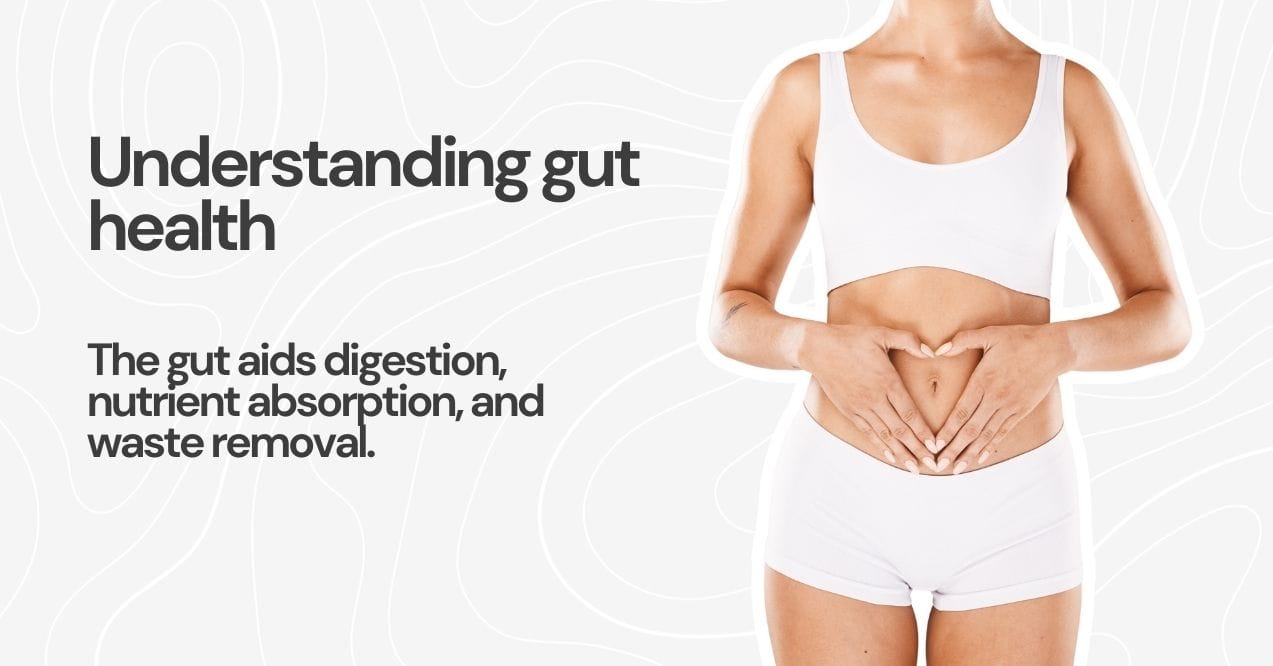
The gut aids digestion, nutrient absorption, and waste removal. It achieves these functions with the help of several microorganisms in the gut, known as the gut microbiome. Now, not all bacteria are harmful! There are also healthy ones, including viruses and fungi, many of which reside in the gastrointestinal tract; this ecosystem is the gut microbiome. What does the gut microbiome do?
- It regulates the immune system.
- It helps in digestion.
- It enhances a healthy gut through balanced gut bacteria.
- It produces vitamins
- It produces and regulates stress, thyroid, and estrogen hormones
- It produces and stores 30 neurotransmitters for the brain and nerves
- It helps regulate mood and sleep
- It helps regulate blood sugar levels and appetite
- It promotes overall health.
About Dysbiosis
Having a compromised gut increases the risk of suffering from dysbiosis. You’re said to have this condition if there’s an imbalance in your gut’s microorganisms. An imbalance can result from excess harmful bacteria or insufficient healthy ones for various reasons like medication, disease, unhealthy diet, or stress, which interfere with your gut microbiome.
Now you understand why the gut ecosystem is crucial and significantly impacts overall health. Proper digestion and nutrient absorption supply the best vitamins for gut health that protect the bloodstream, ensuring optimal physical and psychological well-being.
Health Issues Linked to Poor Gut Health
If prolonged dysbiosis can cause several health issues and affect well-being. For example:
- Colon cell malignancies
- Leaky Gut & systemic inflammation
- Irritable or inflammatory bowel conditions
- Heartburn & acid reflux (GERD)
- Mood disturbances, mental disorders, & brain fog
- Allergies
- Stomach cramps
- Diarrhea or constipation
- Nutritional deficiencies
A diverse and balanced microbiome promotes an optimally functioning gut and overall health. You can achieve this balance through a healthy diet full of gut health vitamins and other nutritional values like probiotics. Here’s a list of what entails a healthy diet:
- Plenty of fruits and veggies
- Fiber-rich foods like whole grains, beans, and avocados
- Fermented foods like yogurt
- Avoid processed food, artificial sweeteners, excess refined sugar, and unhealthy fats

Best Vitamins for Gut Health
The body needs vitamins to function properly. And the gut is no different; vitamins are crucial for its health. They help maintain a healthy gut lining and keep infections at bay to support its proper functioning and prevent inflammation. They also help maintain a balanced microorganisms ecosystem, preventing harmful bacteria growth. Let’s explore the top seven minerals and the best vitamins for gut health.
1. Vitamin B12
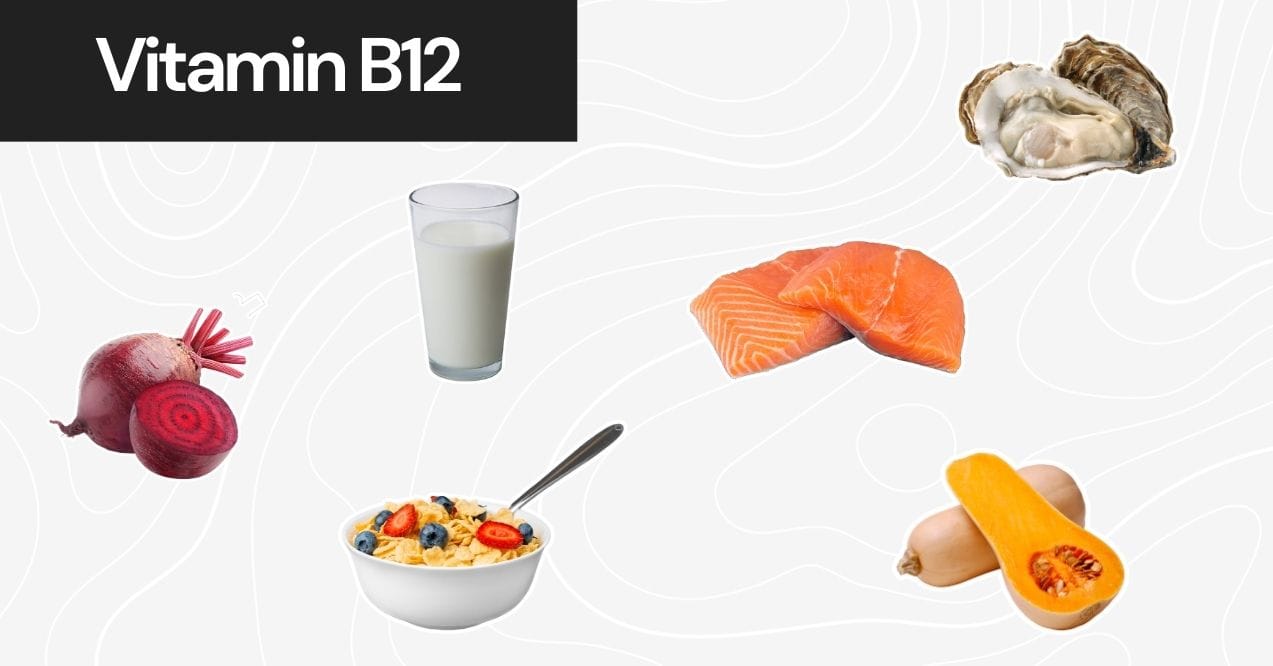
Vitamin B12 nourishes beneficial gut bacteria proliferation. And it supports the production of small chain fatty acids (SCFA) that repair the gut lining and preserve gut and immune integrity. . It also supports bowel regularity, digestive health, and a balanced, healthy microbiome. You can find vitamin B12 in the following foods:
- Beetroot
- Butternut squash
- Milk and milk products
- Oysters
- Salmon
- Fortified cereal and soymilk
2. Zinc
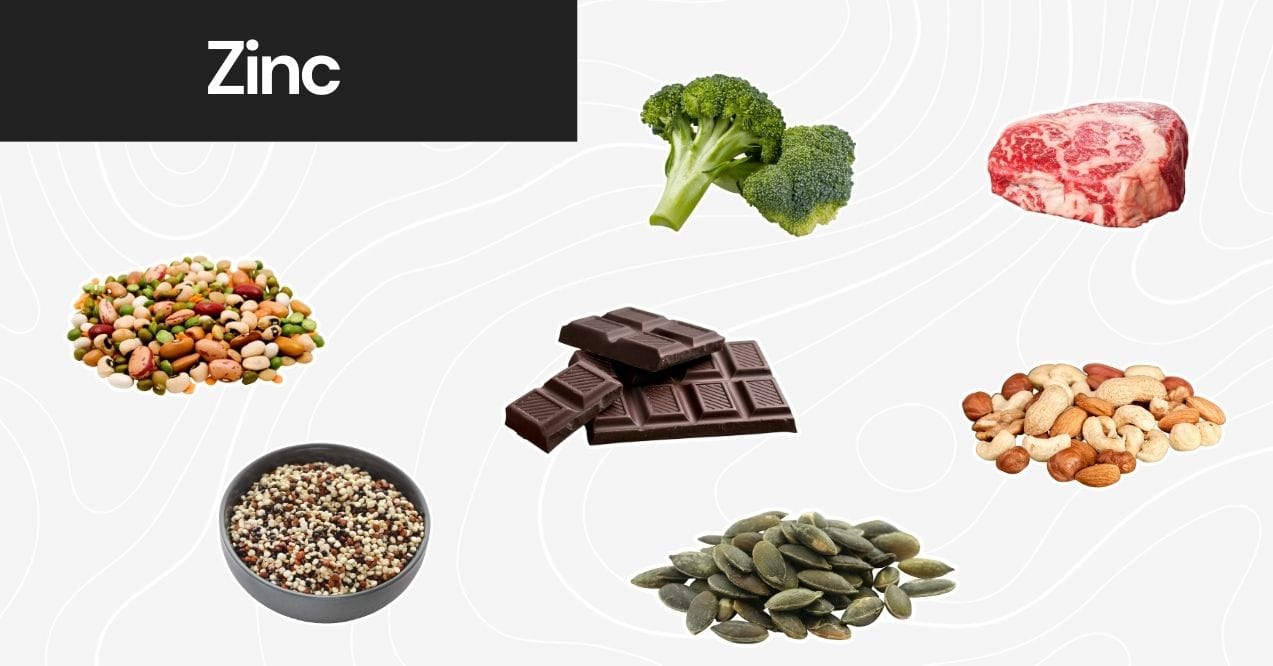
Ever had a wound that healed, and you wondered what helped it? Zinc is a magic mineral! Its powers aid in cell regeneration, which repairs wounded body parts. This function helps reform damaged gut cells, reduces pro-inflammatory molecules, and supports the growth of the epithelial cells. Zinc also promotes the growth of healthy bacteria in the gut, enhancing a balanced microbiome. It’s also crucial for supporting the immune system and fighting disease-causing factors of gut inflammation and promote proper functioning. You can find zinc in the following foods:
- Ribeye steak
- Broccoli
- Pulses like beans and lentils
- Dark chocolate
- Pumpkin seeds
- Nuts
- Quinoa
3. Vitamin D
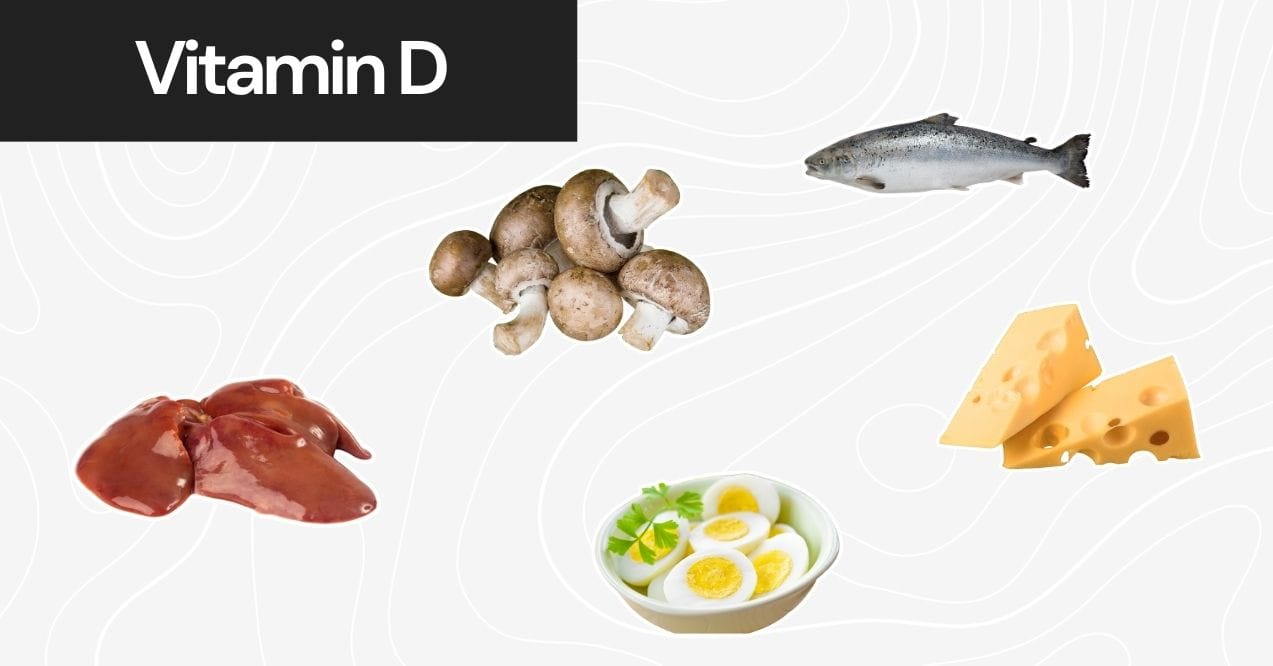
Just like leakage in your plumbing can be detrimental, one in the gut has the same effects. How? Substances found in the gut may be harmful to other body parts. Therefore, leakage into the bloodstream can cause be toxic and cause inflammation.. That’s why there’s a barrier between the intestines and the digestive tract. Vitamin D helps maintain the well-being of this barrier.
It also soothes the gut through the help of its anti-inflammatory properties by regulating the gut’s immune system response. Further, it modulates the production of pro-inflammatory molecules (cytokines), the main cause of inflammation. This function ensures a healthy gut that can function optimally. Additionally, minimizing inflammation promotes a healthy and balanced gut microbiome. Food rich in vitamin D includes the following:
- Mushrooms
- Eggs
- Liver
- Cheese
- Fatty fish
4. Selenium

Though not a gut health vitamin, selenium is vital to enjoy good health. It’s a mineral found in soil. But worry not; that doesn’t mean you need to eat soil. You can find it in foods like:
- Brown rice
- Butter
- Tuna
- Plant-based foods like grains
- Cheese
- Asparagus
- Chia seeds
You’ve heard of antioxidants — substances that reduce the risk of cell damage by destroying free radicals that feed on healthy cells. Selenium is one of them. This mineral’s antioxidant properties helps protect the gut against oxidative stress, cell damage, and pro-inflammatory molecules. . Additionally, it’s an excellent immune system builder. This capability promotes a strong immunity in the gut, protecting against pathogens and facilitating proper digestion and nutrient absorption. That’s not all. Selenium also influences the growth of beneficial gut bacteria, enhancing a balanced microbial composition.
5. Vitamin C

Vitamin C is another essential vitamin for gut health. First, it possesses antioxidant properties that help minimize oxidative damage in the gut, reducing DNA and cell damage that causes inflammation. It’s also a powerful collagen synthesis factor. Here’s what collegen does: It supports strength and structure by promoting new cell growth and replacing dead skin. How does this capability help the gut? It helps maintain the gut tissues and lining intact, enhancing optimal digestion and nutrient absorption.
This magic vitamin also aids in iron absorption in the gut. This benefit promotes the proper functioning of the gut system because iron helps build and recycle red blood cells, which supply the tissues with oxygen. Another function of vitamin C includes the production of mucus. This secretion protects the gut lining and acts as a barrier between the gut cells and microbiota.
This barrier protects the villi for proper nutrient absorption, provides a wall against toxic intestinal products from entering the bloodstream and triggering an immune response, and causing systemic and gut inflammation.. Get your dose of vitamin C from the following foods:
- Oranges
- Cauliflowers
- Kiwi
- Red bell peppers
- Tomatoes
- Potatoes
- Guava
6. Magnesium
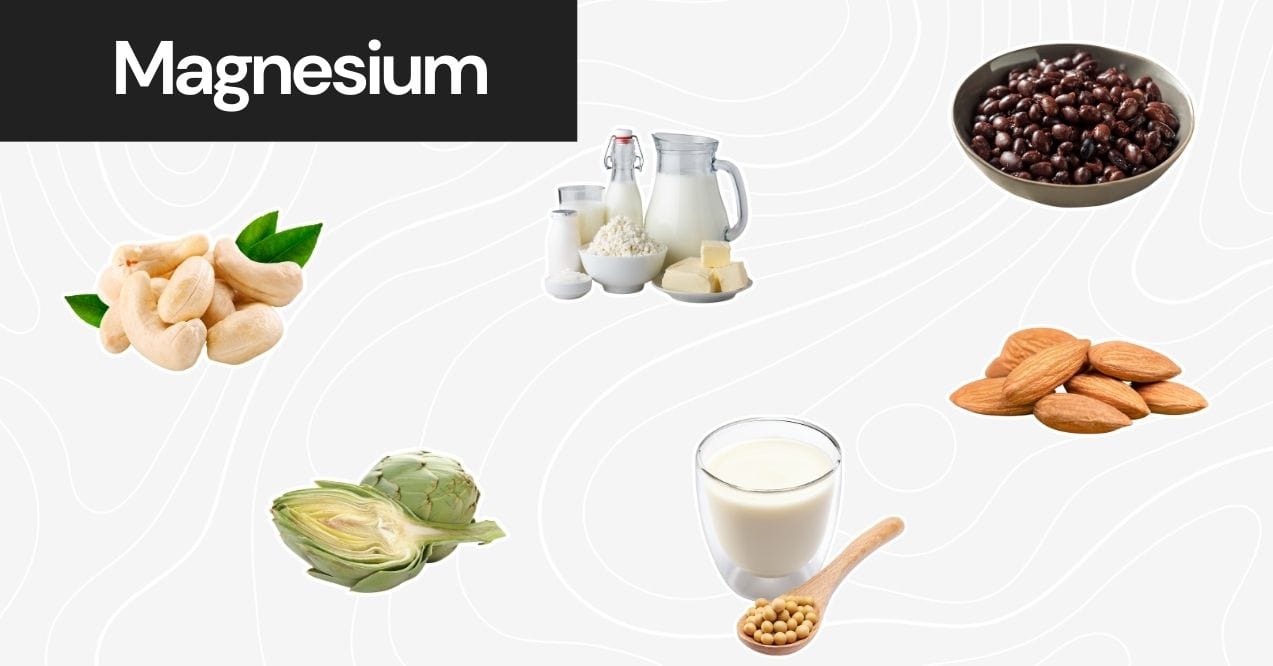
Ever wondered how the food you consume turns to stool? It’s the magic of magnesium! It draws water into the intestines through osmosis, resulting in softened stool for easy passage. This function promotes healthy bowel movement, ensuring you don’t suffer constipation, bloating, or other irritations due to a poor-functioning gut. Additionally, voiding stool helps eliminate toxins from the body, preventing the accumulation of harmful bacteria and supporting a balanced gut microbiome.
Magnesium also facilitates muscle contraction and relaxation. How is this function beneficial to gastrointestinal health? The digestive process requires gut motility for bowel movement, which rely on gut muscles. Therefore, the more functional they are, the better the gut works. Magnesium’s anti-inflammatory properties further support the gut by helping alleviate gut disorders, hyperacidity-related discomforts, and bacteria imbalances. Foods rich in magnesium include:
- Almonds
- Soy milk
- Dairy products
- Cashews
- Black beans
- Artichokes
The Rising Trend of Supplement Powders
Incorporating vitamins for gut health into your diet is easy; keep it green and colorful using veggies and fruits. You can also add whole grains and lean proteins like fish and meat. However, there’s a solution if you struggle to get enough vitamins from your food; supplement powders.
Supplement powders supply the body with concentrated amounts of nutrients similar to the ones found in food. They have gained popularity in recent years as more people pursue better health. And this preference is because of their convenience, as you can easily incorporate them into your daily routine by adding them to food, drinks, smoothies, and porridge. Additionally, they are easier to absorb and produce less stress than certain foods on a distressed gut.
Certain dietary restrictions, demographics, lifestyles, and conditions demand supplements. For instance, vegetarians, the elderly, athletes, fitness enthusiasts, sick individuals, and those looking to enhance their gut health. When you take supplement powders, you enjoy advantages such as:
- Raised energy and vitality
- Optimize gut health
- Support healthy immune system responses
- Promote clear skin
- Reduce the appearance of wrinkles
- Promote healthy aging
Difference Between Quality and Non-Quality Supplements
Not all supplement powders are created equal. . So it’s crucial to understand the differences. Luckily, we have the inside info!
Quality supplement powders use first-rate ingredients. They also adhere to health, dietary, and safety regulations, ensuring thorough testing to guarantee quality. On the contrary, poor-quality supplements have high amounts of fillers and artificial additives. Here are a few pointers on how to tell the difference:
- The more detailed the label, the more trustworthy the product is.
- Read the ingredient label to ascertain the contents.
- Choose supplements with standardized and clinically tested components.
- Reviews are an excellent testament to quality; check them out for first-hand opinions.
- Dark, airtight packaging keeps away light and moisture, preventing the alteration of the supplement’s composition.
Examples of High-Quality Supplement Powders

Not getting enough veggies, too busy for a healthy meal, or feeling lethargic? Let’s introduce you to the ultimate superfood, the organic Trumeta Metabolic Greens supplement powder. First, it warrants purity and excellent quality as it is USDA approved. This approval ensures the elimination of unnecessary preservatives and verifies pesticide-free farming and strict manufacturing practices. This organic superfood powder contains ingredients that boost your metabolism. It also promotes healthy skin, improved detoxification, and digestion as it nourishes your body to restore harmony.
The supplement powder comes in tight dark-colored packaging, a feature that protects the content from possible damage by moisture or oxidation. So unlike other products, it stays intact and delivers the required nourishment to your body without compromise. Athletes and busy professionals also marvel at its energy-enhancing capabilities. This nutrient-rich alternative to caffeine is ideal for mid-day fatigue slumps.. Think of it as a fantastic option for getting all the gut health vitamins and goodness without the hustle of cutting greens and cooking when swamped.
Other Ways to Support Gut Health

Besides a healthy diet and supplements, there are various ways of enhancing your gut health. The power is in your hands, from lifestyle habits to simple health choices. Let’s explore some options to support gut health:
Sleep Your Way Into Gut Health
Sleep is a powerful hormone regulator that controls appetite hormones. Its deprivation interferes with the proper functioning of these hormones, causing cravings and overeating, which yield metabolic disorders that impair the gut’s functioning. Healthy sleep also strengthens the immune system, improves detoxification, stress, and promotes a healthy gut. Further, insufficient sleep negatively affects digestion leading to bloating and dysfunctional stool movements. The result? Impaired production of digestive enzymes and an imbalanced gut microbiome.
Stress Management
Stress affects blood flow. And insufficient blood flow denies the gut oxygen for efficient nutrient absorption. Secondly, the gut contains mucus and acids that lubricate the stomach and intestines for digestion and bowel movements. Stress is detrimental to this system as it negatively affects mucus secretion.
In addition, it can disrupt the gut’s microbiome balance. Therefore, keeping your psychological well-being in check is vital. You can do this by taking breaks, exercising, or through therapy.
For a balanced gut ecosystem, probiotics and prebiotics are necessary. They are healthy microorganisms found in supplements and fermented foods like yogurt and sauerkraut. Furthermore, they aid digestion and replenish beneficial gut bacteria when pathogens and antibiotics reduce them.
Final Thoughts
In conclusion, gut health plays a vital role in your overall well-being. A healthy gut ensures proper digestion and absorption of nutrients, which form the foundation for strong immunity and the absence of gastrointestinal disorders. Maintaining gut health through healthy diet and lifestyle choices like proper sleep and stress management elevates your overall well-being and inspires enthusiasm and passion for life.
You can also take dietary supplement powders to support optimal nutrition and gut health vitamins. And if you’re wondering where to start, the tips in this article have you covered. Please put them to use and embrace healthy habits today to take control of your health and take proactive steps toward improving your gut health.
Enjoyed the article? Check out another recent one about the best gut detox options!
Key vitamins for gut health include Vitamin B12, Vitamin D, Vitamin C, and minerals like zinc and magnesium. These nutrients help maintain the gut lining, support digestion, reduce inflammation, and promote a balanced gut microbiome for overall well-being.
Stress disrupts the gut by affecting blood flow and mucus production, which can hinder digestion and nutrient absorption. It also disrupts the balance of healthy gut bacteria, leading to imbalances that may result in digestive issues like bloating and indigestion.
Yes, supplement powders provide concentrated nutrients that support gut health. They offer vitamins and minerals that are easily absorbed and can enhance digestion, promote a healthy microbiome, and reduce inflammation. Trumeta Metabolic Greens, for example, supports metabolism, detoxification, and overall digestive health.
Advertisement. This site offers health, wellness, fitness and nutritional information and is designed for educational purposes only. You should not rely on this information as a substitute for, nor does it replace, professional medical advice, diagnosis, or treatment. If you have any concerns or questions about your health, you should always consult with a physician or other health-care professional. Do not disregard, avoid or delay obtaining medical or health related advice from your health-care professional because of something you may have read on this site. The use of any information provided on this site is solely at your own risk.

